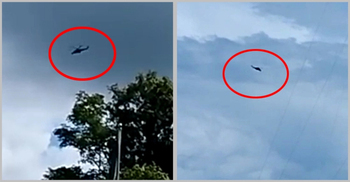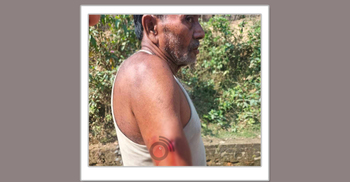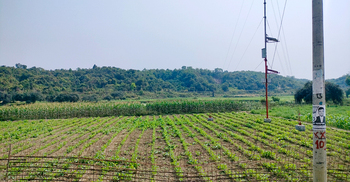58 Myanmar border guards take refuge in Bangladesh

At least 58 members of Myanmar's paramilitary Border Guard Police (BGP) on Sunday took refuge in Bangladesh fleeing their posts amid reports of heavy gunfights between the government troops and the rebels in the junta-run country.
"Fifty eight BGP personnel took shelter in Bangladesh throughout the day since the predawn hours. Fourteen of them crossed the border with bullet wounds and are being treated at different hospitals, including health facilities in Rohingya camps," said an official familiar with the development.
He added the paramilitary soldiers were kept under their counterpart Border Guard Bangladesh (BGB) custody in Cox's Bazar while the weapons they carried with them were deposited in the BGB cache.
The official said many of the soldiers came to Bangladesh territory in combat uniforms and weapons while others were in their plainclothes leaving as well their arms back home.
BSS obtained the photograph of the last BGP solider who crossed the border in barefoot and plainclothes carrying his rifle while the 14 others were in their combat uniform.
"The BGB informed the development to their Myanmar counterparts," said the official, preferring anonymity.
Dhaka, meanwhile, expressed concerns as the skirmishes in its borders with Myanmar were affecting Bangladesh frontlines with Road Transport Minister and Awami League General Secretary Obaidul Quader seeking Chinese intervention to deescalate the conflict in view of Beijing's close contacts with Burmese authorities.
"The internal war is their (Myanmar's) domestic concern. But when the sound of gunfights is heard at the border, naturally it creates panic in the public mind. We, therefore, expected Beijing's intervention," Quader told newsmen after he met with the Chinese envoy.
Officials earlier said 14 BGP personnel crossed the border in predawn hours through the Ghumdhum border while a BGB spokesman in Dhaka thereafter asked journalists to await a media briefing on the development but no official briefing was made until the evening.
District administration of Bandarban, where the troubled frontier is located, closed five schools for security reasons fearing mortar shells or stray bullets to landside Bangladesh territory as the gunfights are underway on the other side of the border.
BGB asked local residents to stay indoors or move cautiously for safety while the skirmishes in southern and northern parts of Tombru, also known by the same name in Myanmar, appeared to be fiercest so far. Tombru is located in Ghumdhum union of Naikhongchhari upazila of Bandarban.
Officials said reports from other side of the border suggested army helicopters were strafing on rebel fighters escalating concerns of massive casualties.
Residents in frontier villages including local Union Parishad members said sounds of gunfights on the Myanmar side of the border on Saturday night and Sunday panicked residents in villages in the frontier.
A BSS reporter said the reported skirmishes between the government troops and the rebel Arakan Army frightened residents in several frontier Bangladesh villages as several mortar shells and bullets landed inside Bangladesh in the past several days though no casualty was reported.
"In two such latest incidents on Saturday night a bullet smashed the windshield of a battery-run three wheeler and a mortar shell hit a village house at Tombru area of Ghumdhum border but no one was wounded," a member of the local union council, the lowest local government-tier, told reporters.
Bangladesh earlier ordered an extra security vigil on border with Myanmar in view of the gunfights between the Myanmar military and the insurgent Arakan Army, which is active in the bordering Rakhine region of the country.
International media reports suggested several more insurgent groups, some forming alliance among them, are confronting the government army in several parts of Myanmar.
Bangladesh's border with Myanmar stretches 271.0 kilometres (168.4 miles), from the tri-point with India in the north, to the Bay of Bengal in the south.
Bangladesh played a critical role over a million Muslim minority Rohingyas who fled their home in Rakhine and took refuge in Bangladesh to evade persecution, particularly after a 2017 army crackdown but the current crisis visibly is little to do with the Rohingyas.
Bangladesh won praises for the handling of the world's biggest refugee crisis while Dhaka repeatedly sought their repatriation to their homeland in Rakhine saying the Rohingyas were causing economic, social, security and environmental problems.
The issue is now the subject of a United Nations genocide investigation at the International Court of Justice.
Source: BSS





